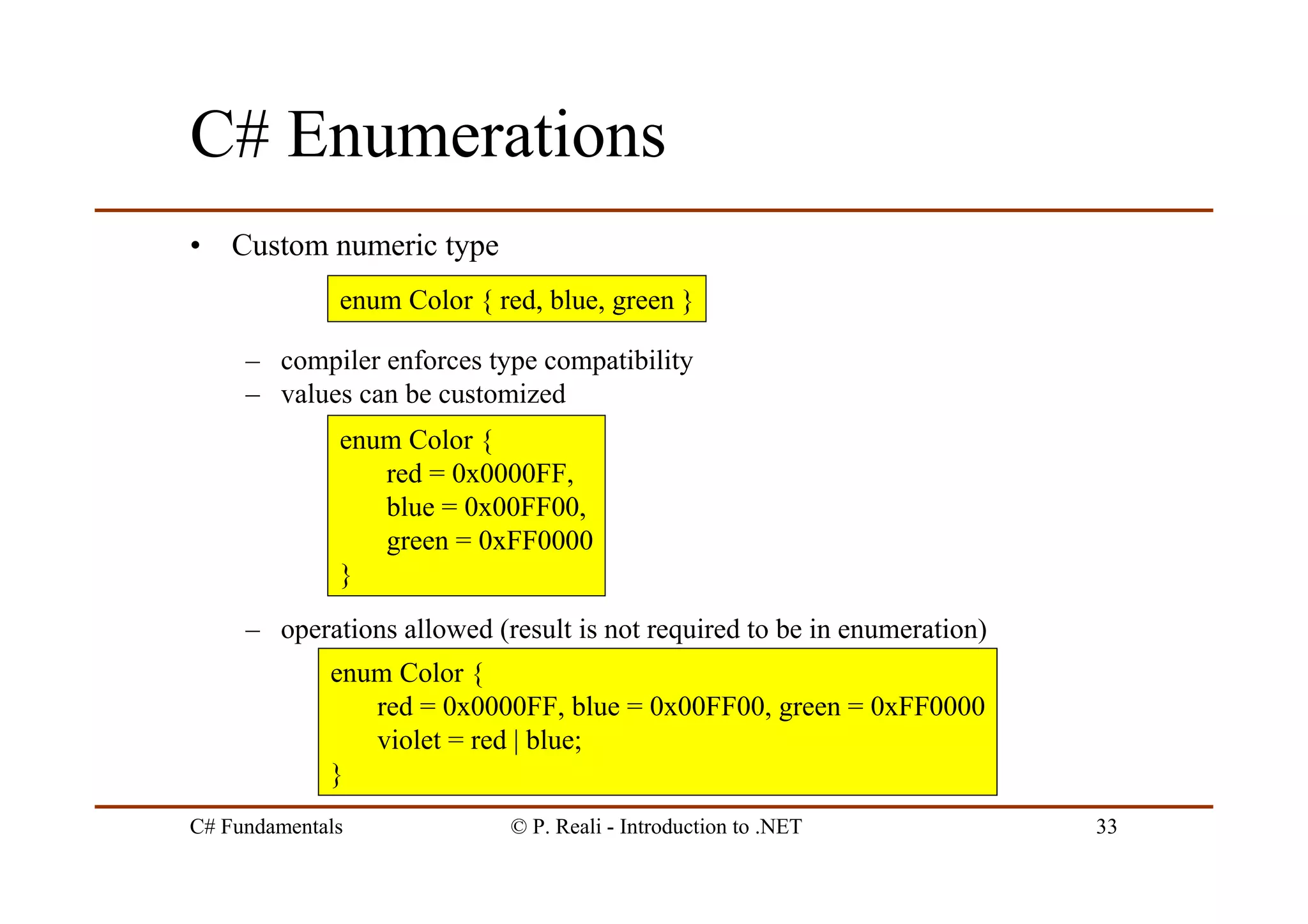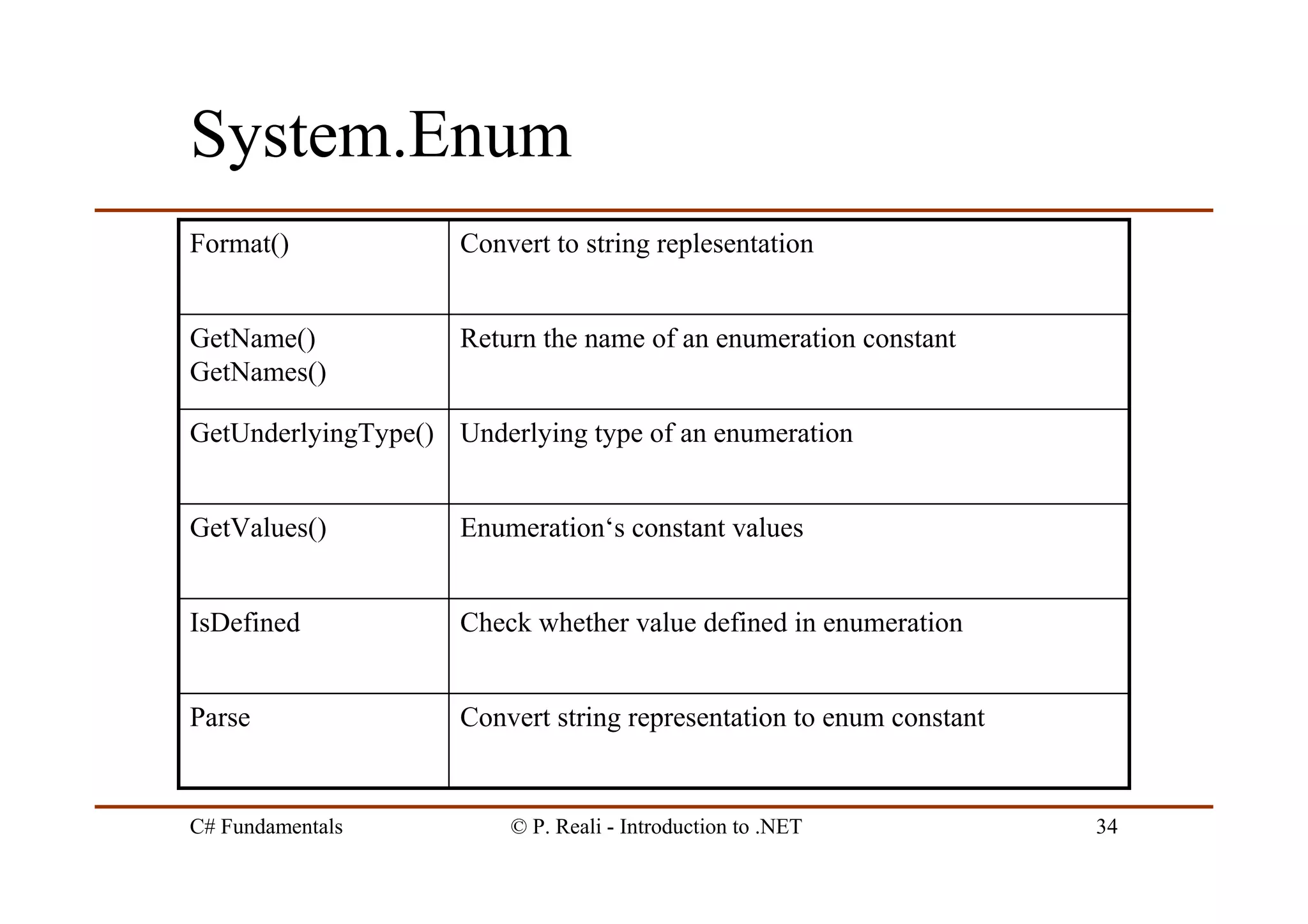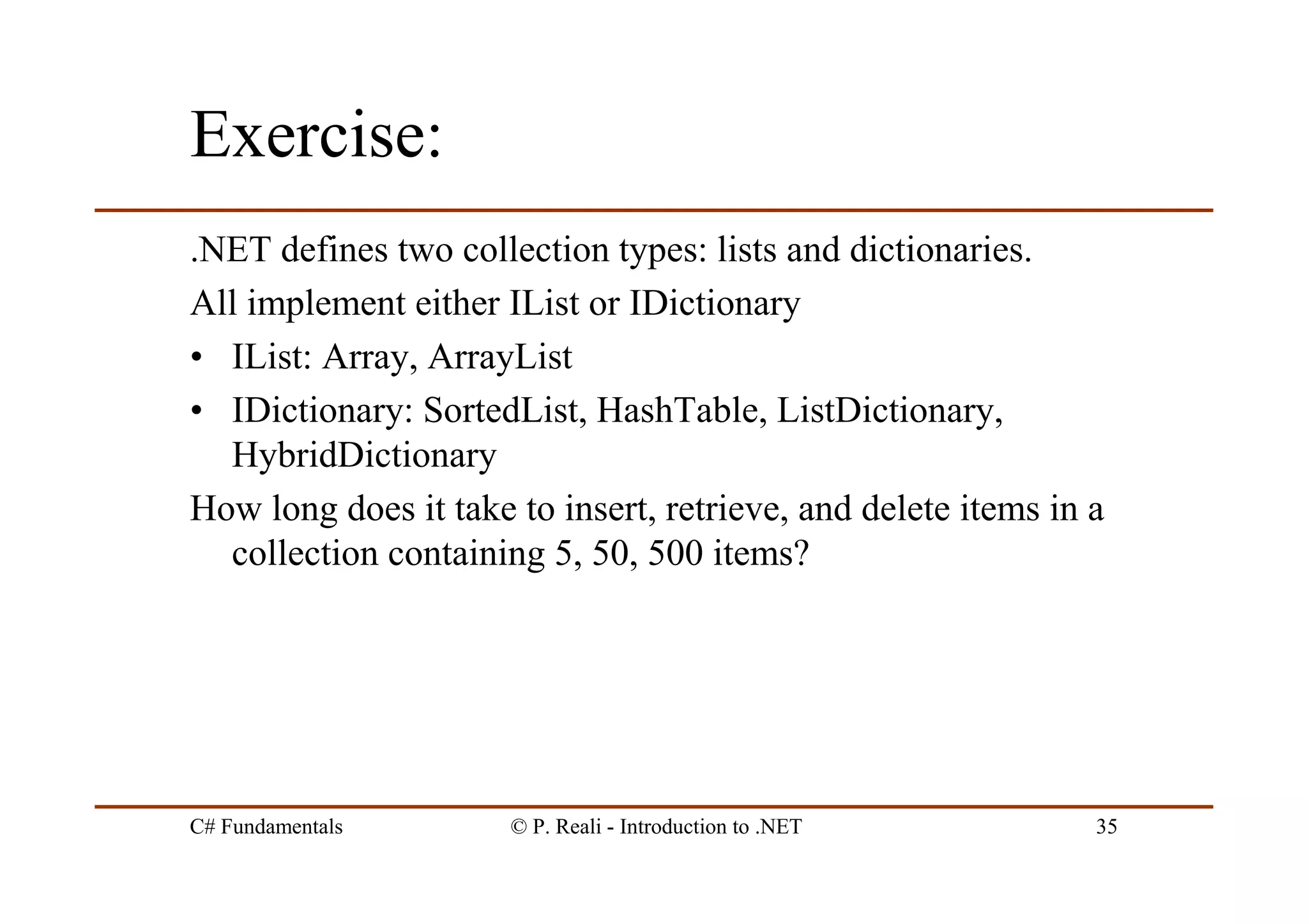The document covers C# fundamentals including class declarations, the main method, data types, control flow, and iteration constructs. It explains concepts like namespaces, value types vs. reference types, and provides insight into built-in types and operations. Additionally, it includes details on access modifiers, parameter modifiers, arrays, strings, and collection types within the .NET framework.
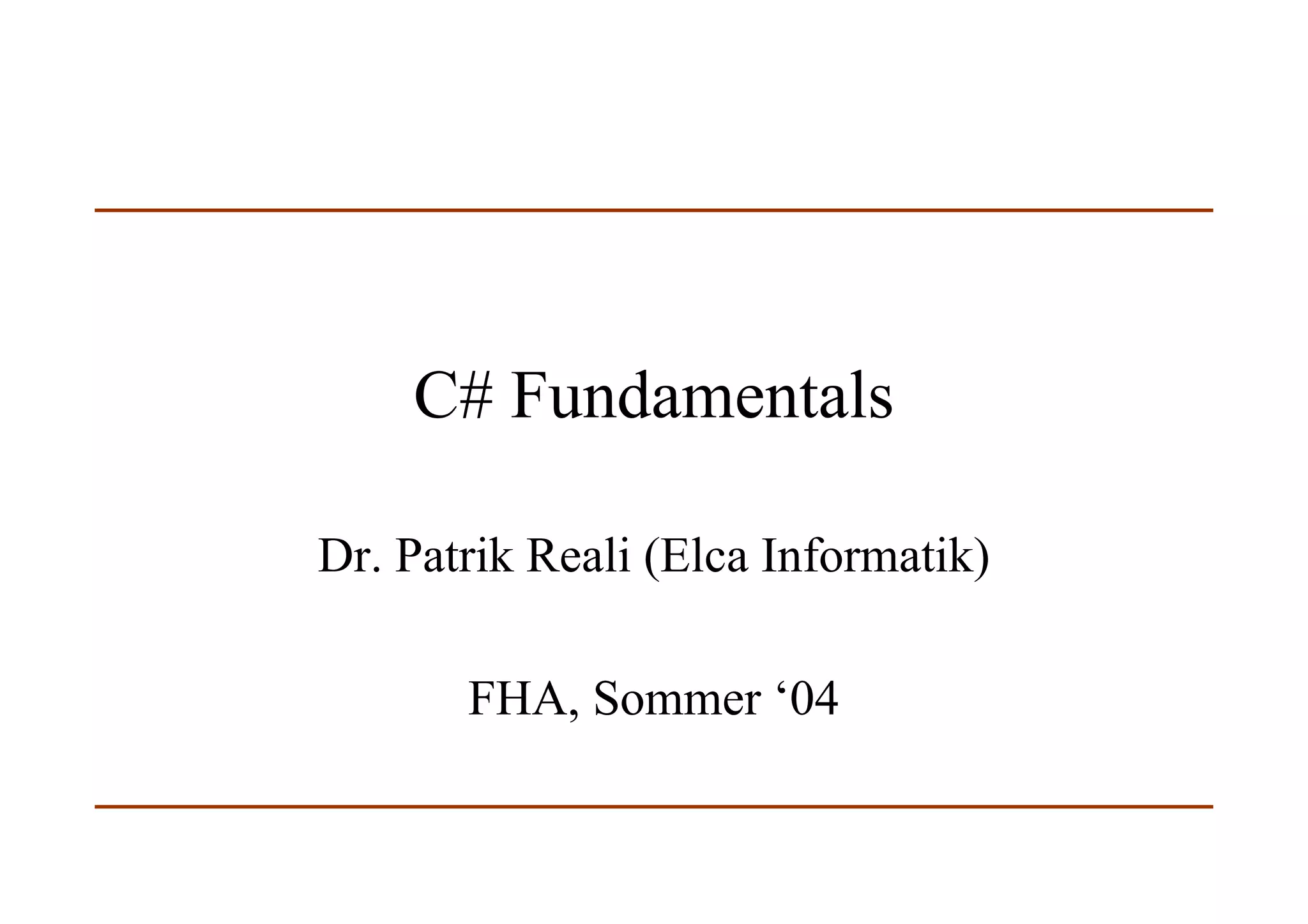
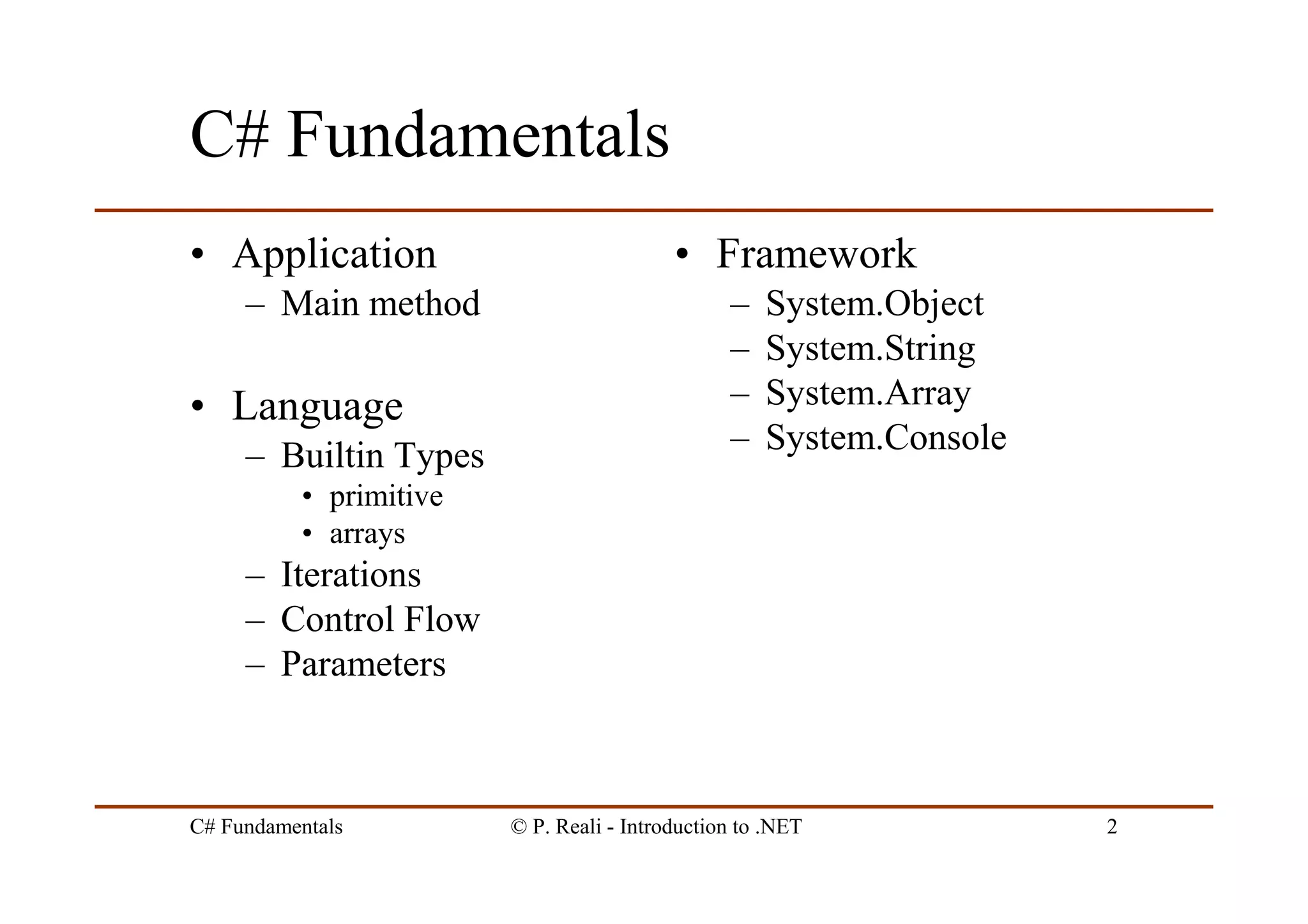
![C# Fundamentals © P. Reali - Introduction to .NET 3
C# Class Declaration (partial!)
• A class is defined with
• Modifiers: (...complete list later...)
– visibility (e.g. public, private)
– binding (e.g. static, virtual, override)
– restrictions (e.g. abstract, readonly)
[modifiers] class ClassName {
// fields
[modifiers] type FieldName [= initial value];
// constructors
[modifiers] ClassName([arguments]) [: this/super([arguments])]{
//code
}
// methods
[modifiers] type MethodName([arguments]) {
// code
}
}](https://image.slidesharecdn.com/drarchanadhawanbajaj-csharpfundamentalsslides-140609140720-phpapp01/75/Dr-archana-dhawan-bajaj-csharp-fundamentals-slides-3-2048.jpg)
![C# Fundamentals © P. Reali - Introduction to .NET 4
C# Class Declaration
using System;
class Hello {
private String name;
private void Greet() {
Console.WriteLine(„Hello {0}“, name);
}
public static void Main(String[] args) {
Hello me = new Hello();
me.name = args[0];
me.Greet();
}
}
class name
field
method
method body
static method
(class method)
method
parameterslocal variable
method
invocation
public Hello() {
}
constructor
(implicit)](https://image.slidesharecdn.com/drarchanadhawanbajaj-csharpfundamentalsslides-140609140720-phpapp01/75/Dr-archana-dhawan-bajaj-csharp-fundamentals-slides-4-2048.jpg)
![C# Fundamentals © P. Reali - Introduction to .NET 5
C#: Main() Method
Main must
– be named Main
– be static
Main can
– return void or int
– have (void) or
(string[]) parameters
public static void Main() {
// Main
}
public static int Main(string[] args) {
// Main
return result_code;
}
public static void Main(string[] args) {
// Main
}](https://image.slidesharecdn.com/drarchanadhawanbajaj-csharpfundamentalsslides-140609140720-phpapp01/75/Dr-archana-dhawan-bajaj-csharp-fundamentals-slides-5-2048.jpg)
![C# Fundamentals © P. Reali - Introduction to .NET 6
C# Command Line Parameters
• Test.exe abc 5 blah 3.2
• output:
using System;
class Test {
public static void Main(String[] args) {
for(int x = 0; x < args.Length; x++) {
Console.WriteLine(„Arg[{0}] = {1}“, x, args[x]);
}
}
}
abc
5
blah
3.2](https://image.slidesharecdn.com/drarchanadhawanbajaj-csharpfundamentalsslides-140609140720-phpapp01/75/Dr-archana-dhawan-bajaj-csharp-fundamentals-slides-6-2048.jpg)
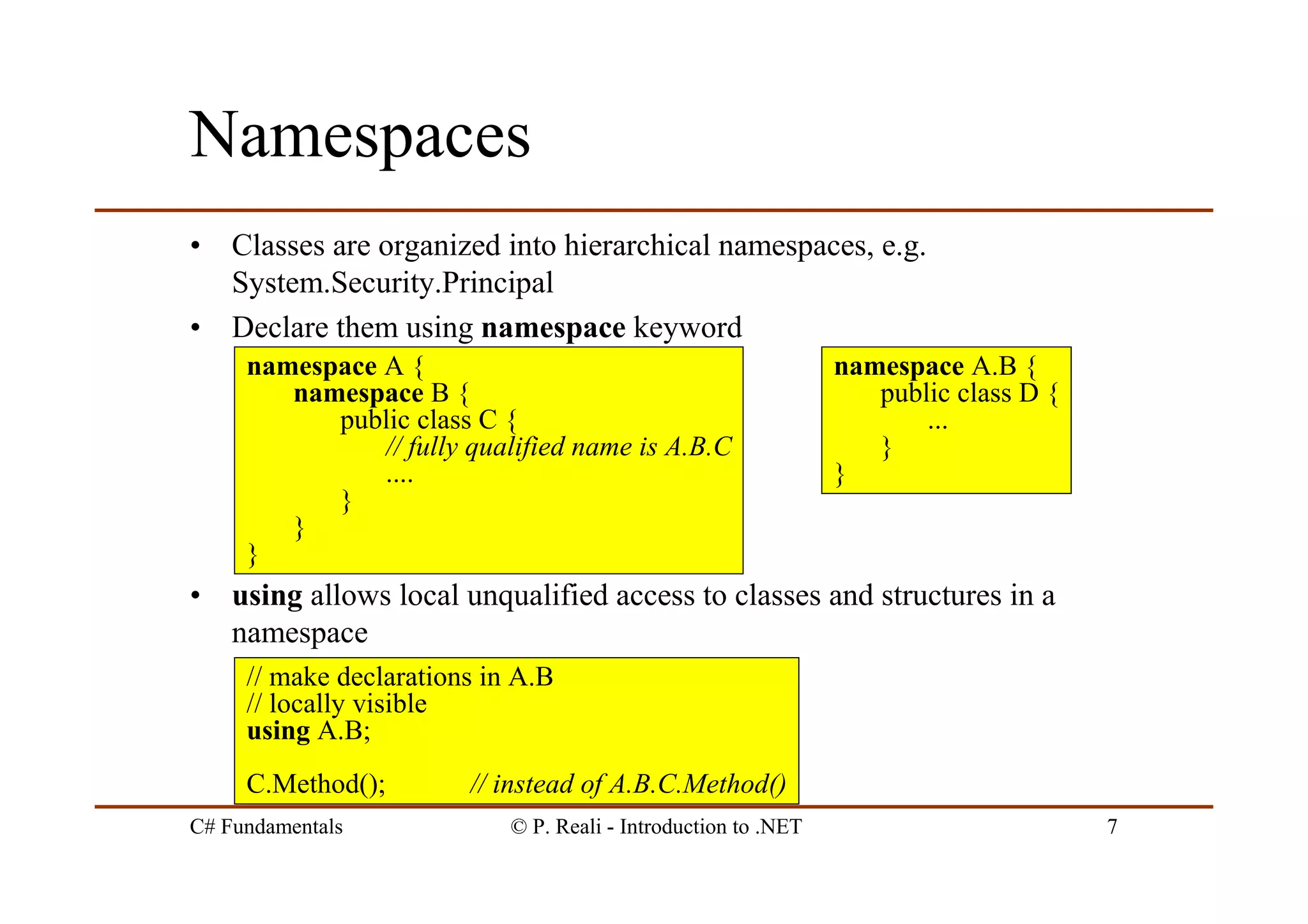
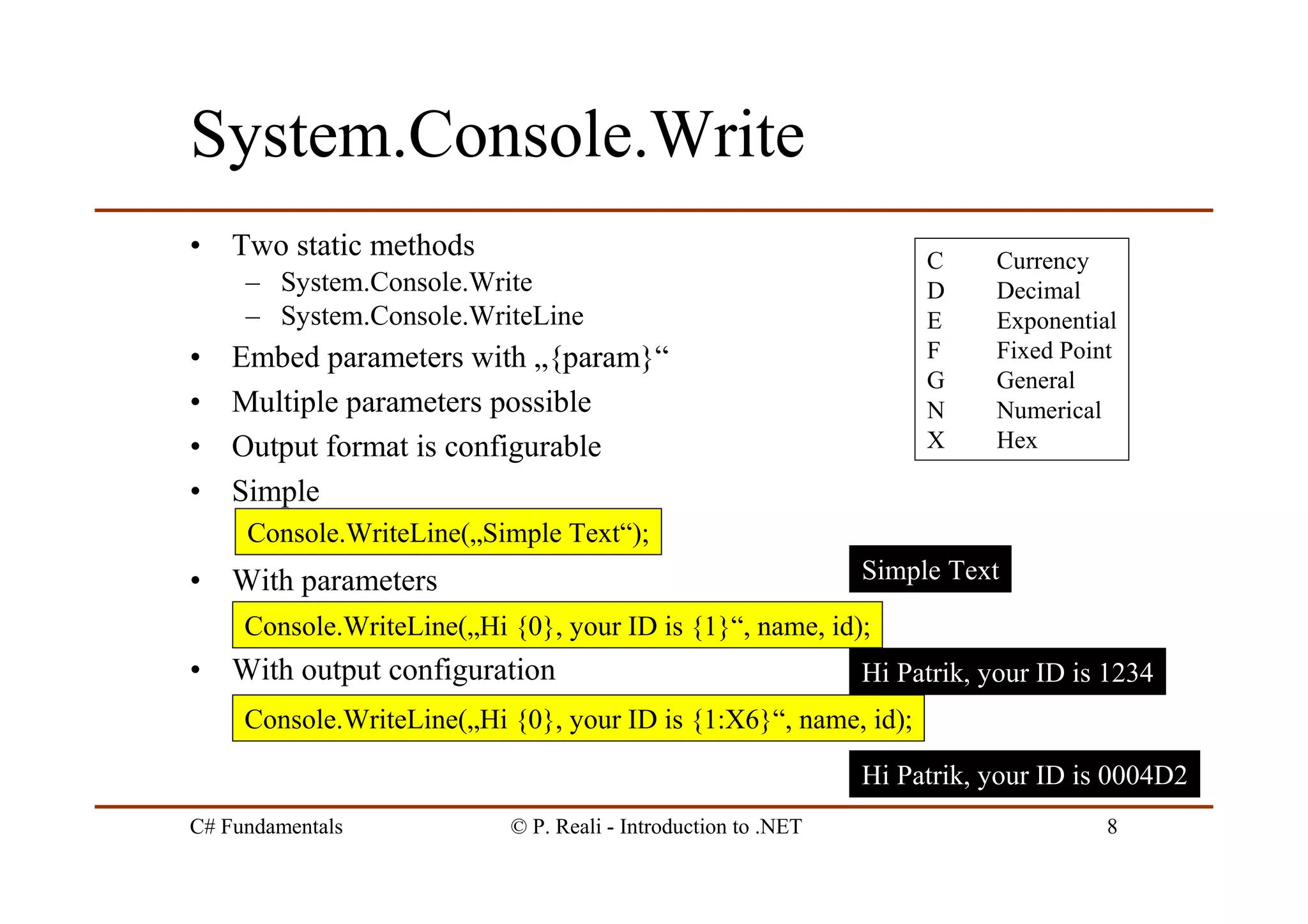
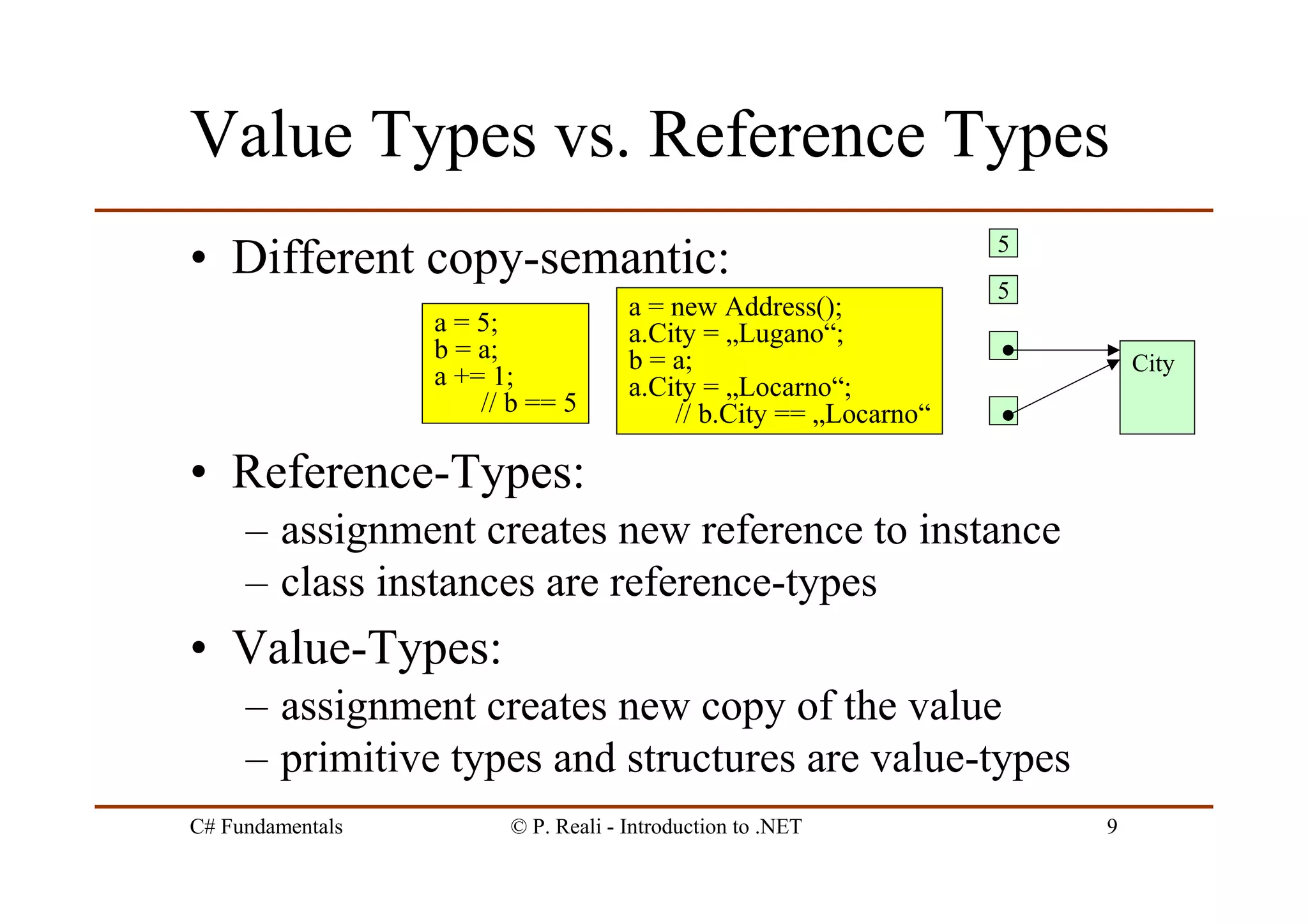
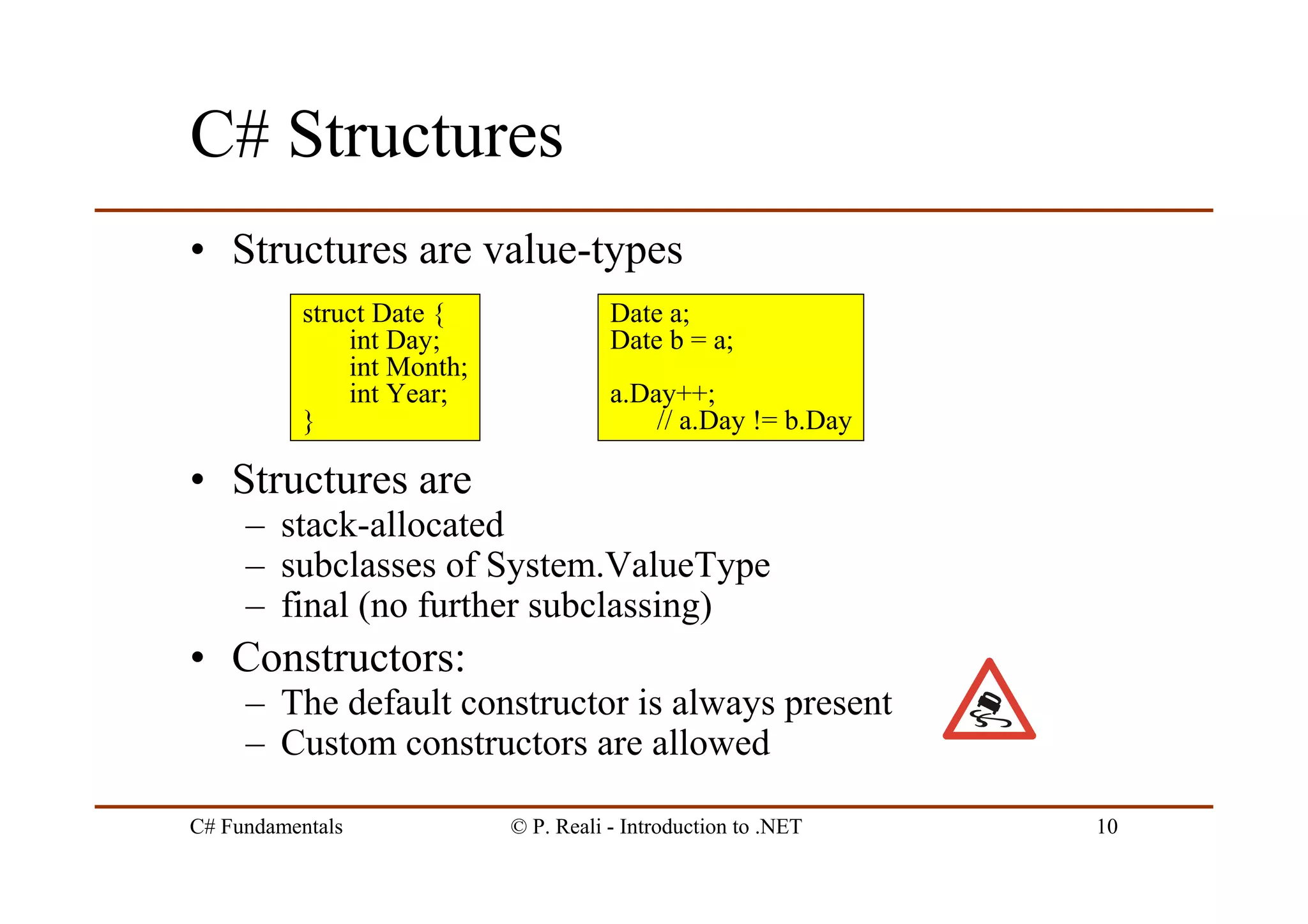
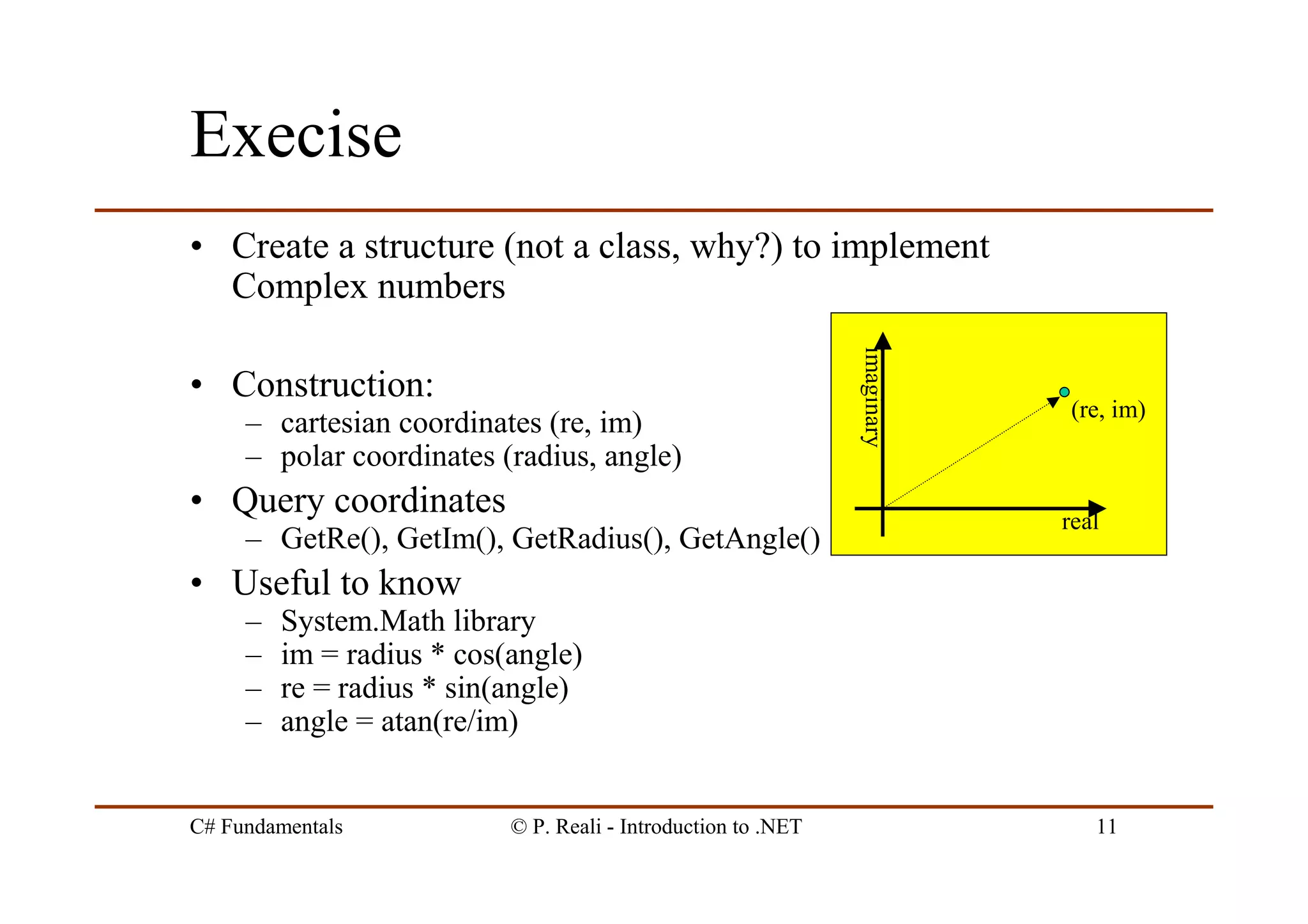
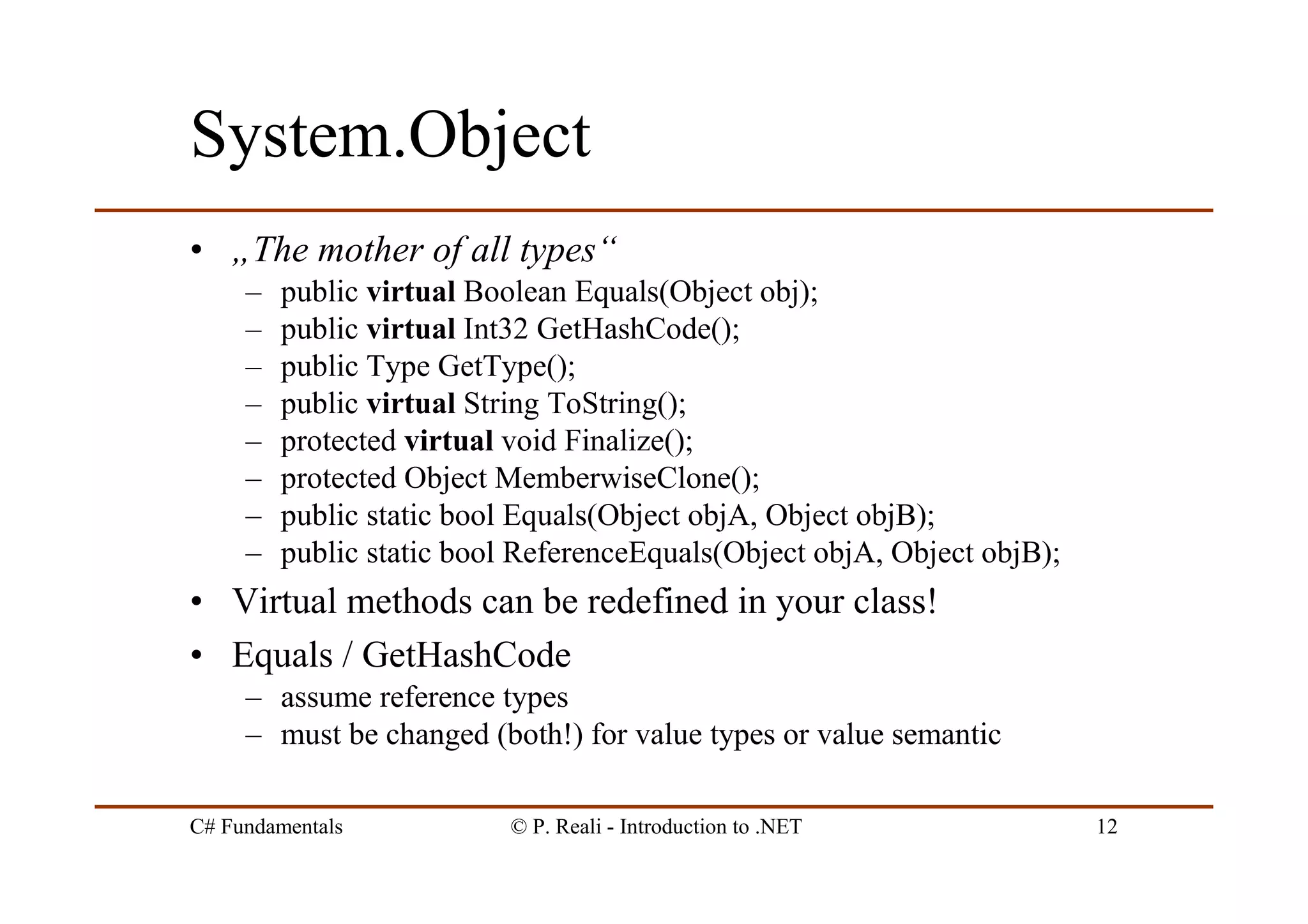
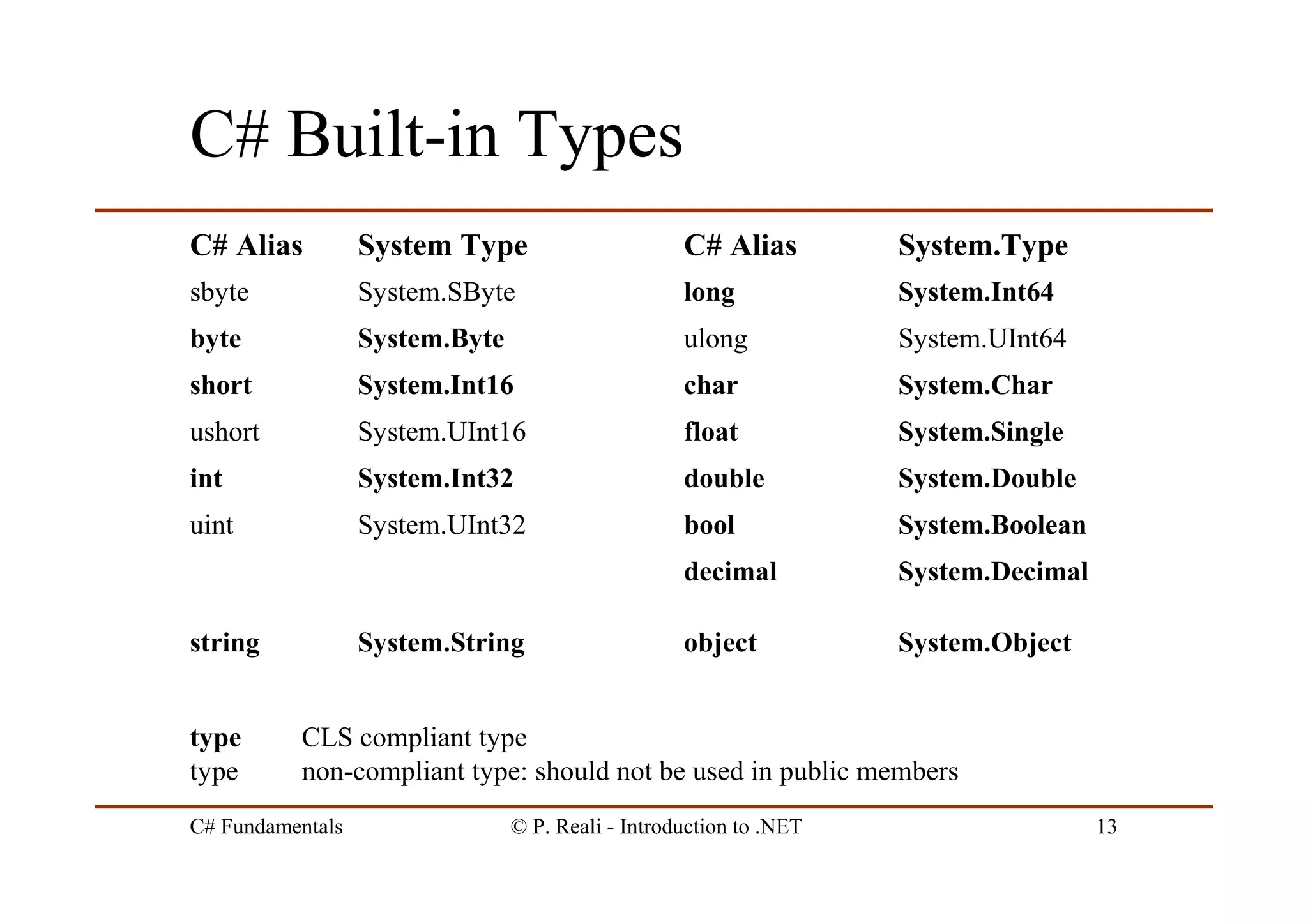
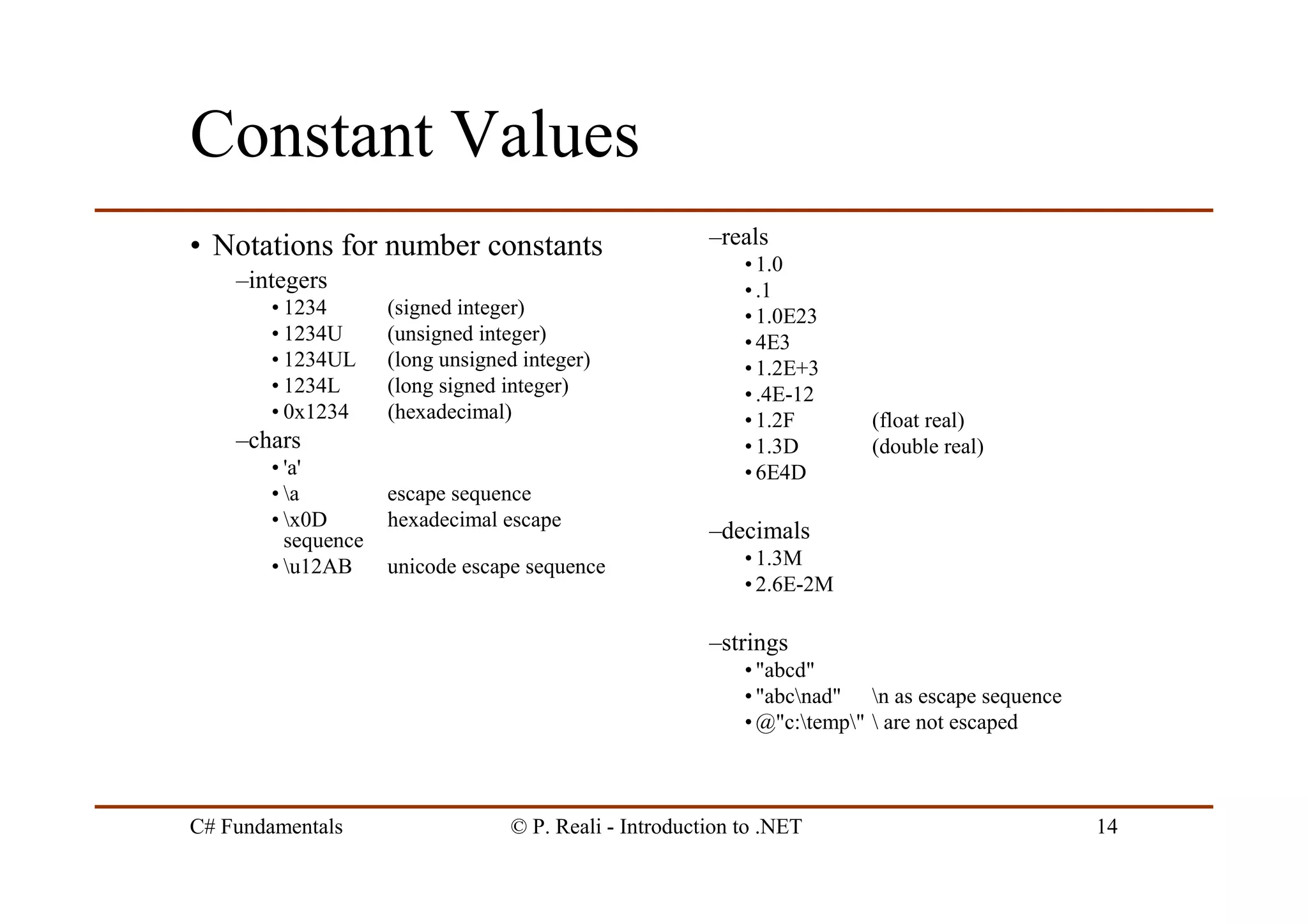
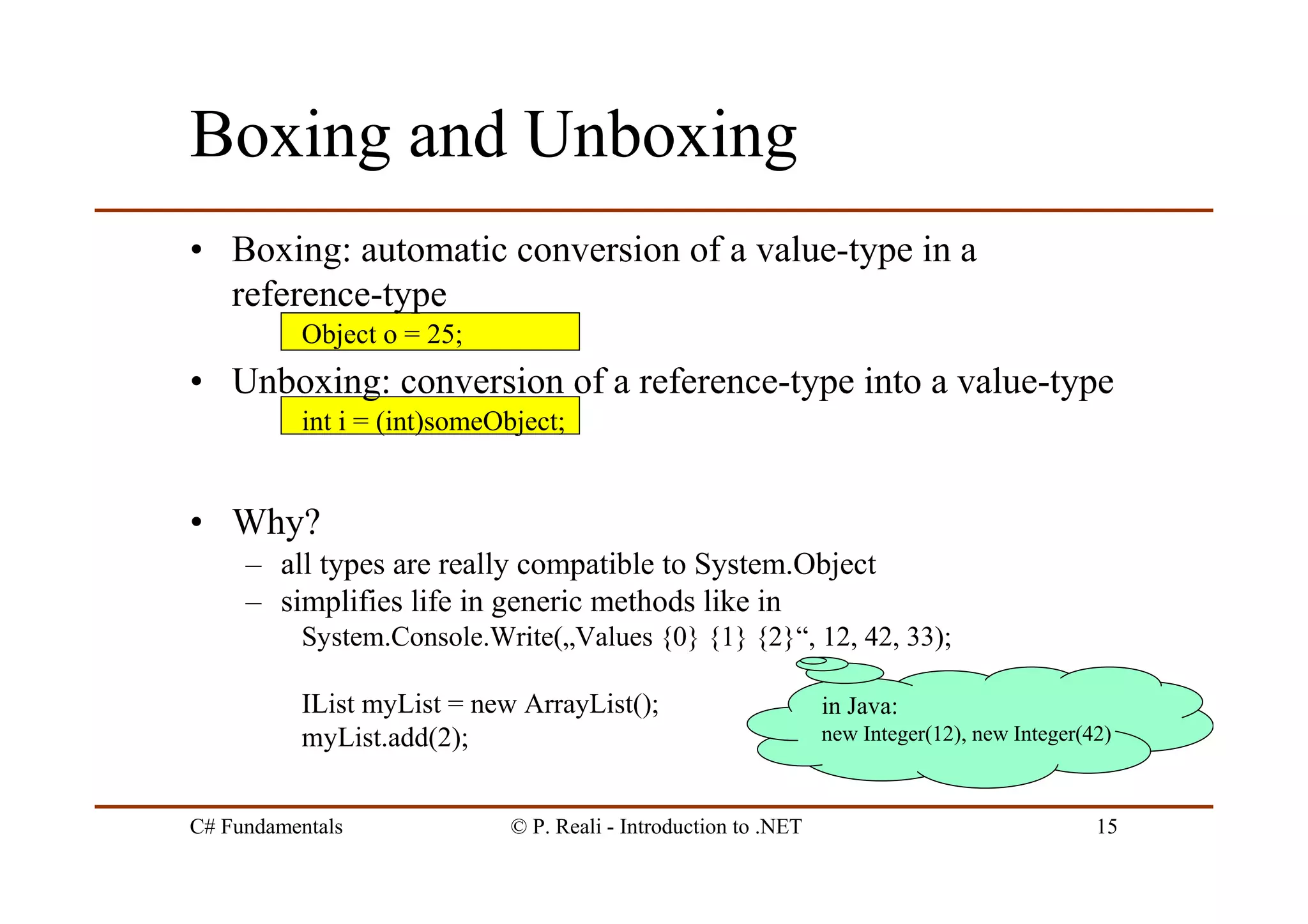
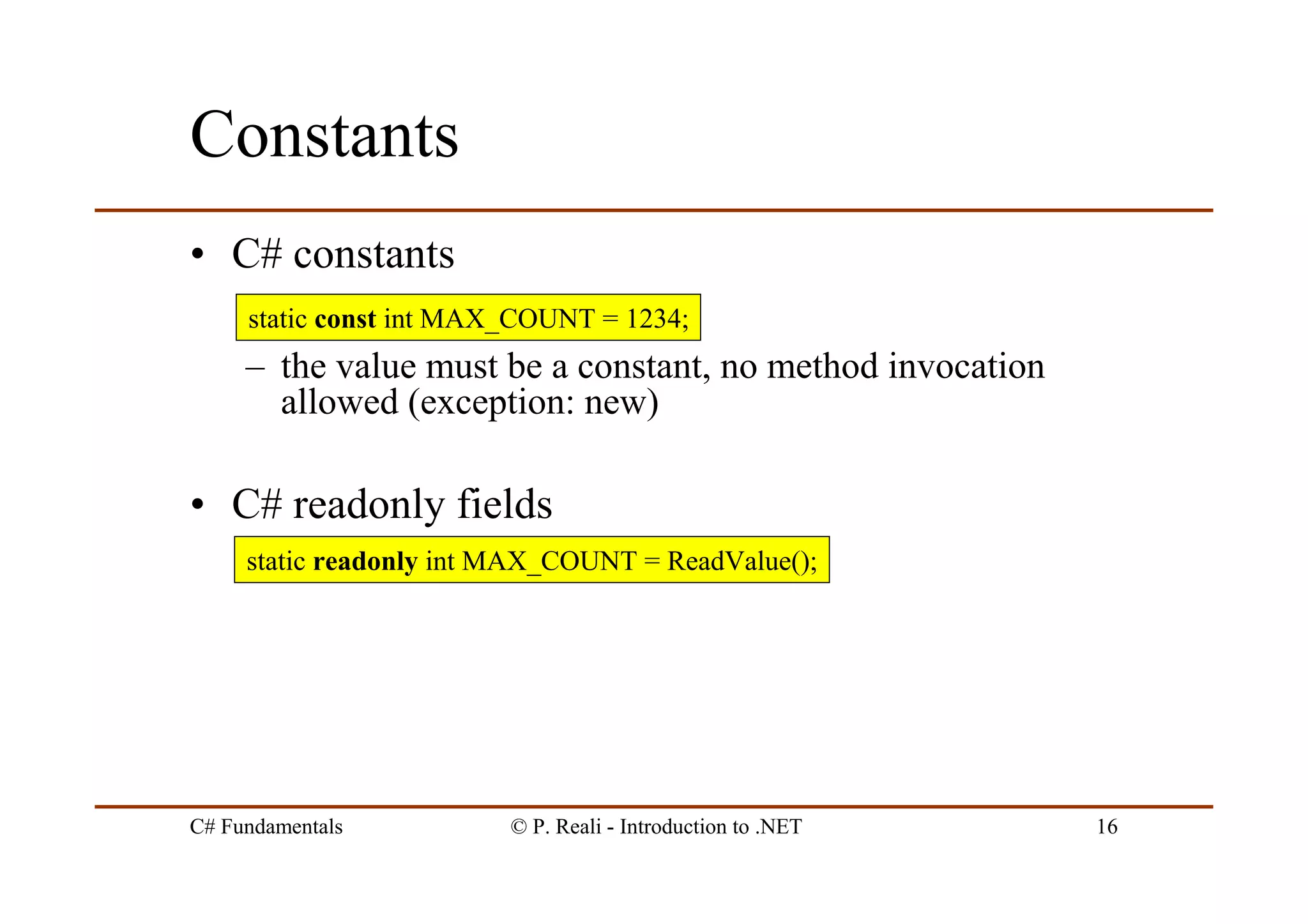
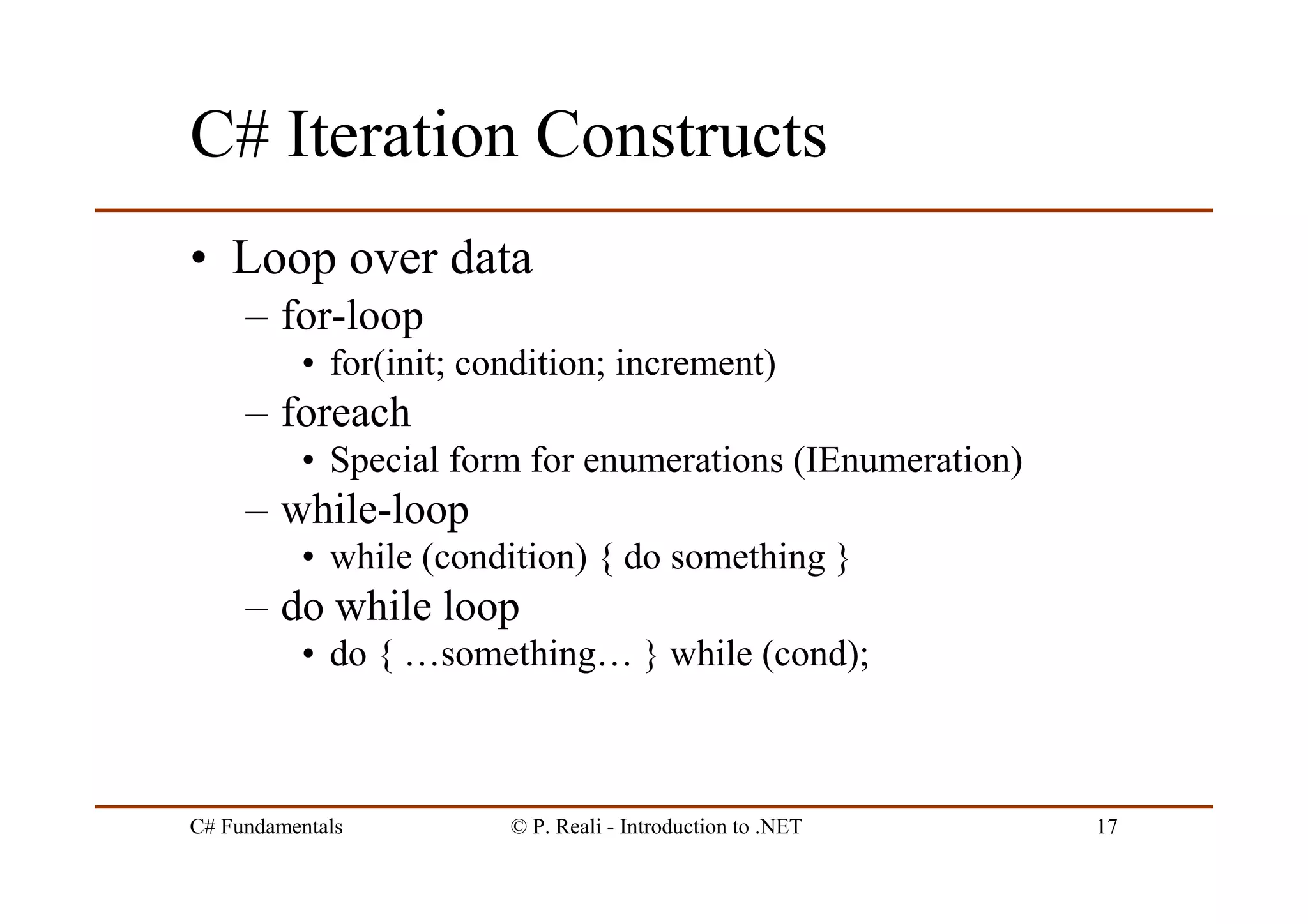
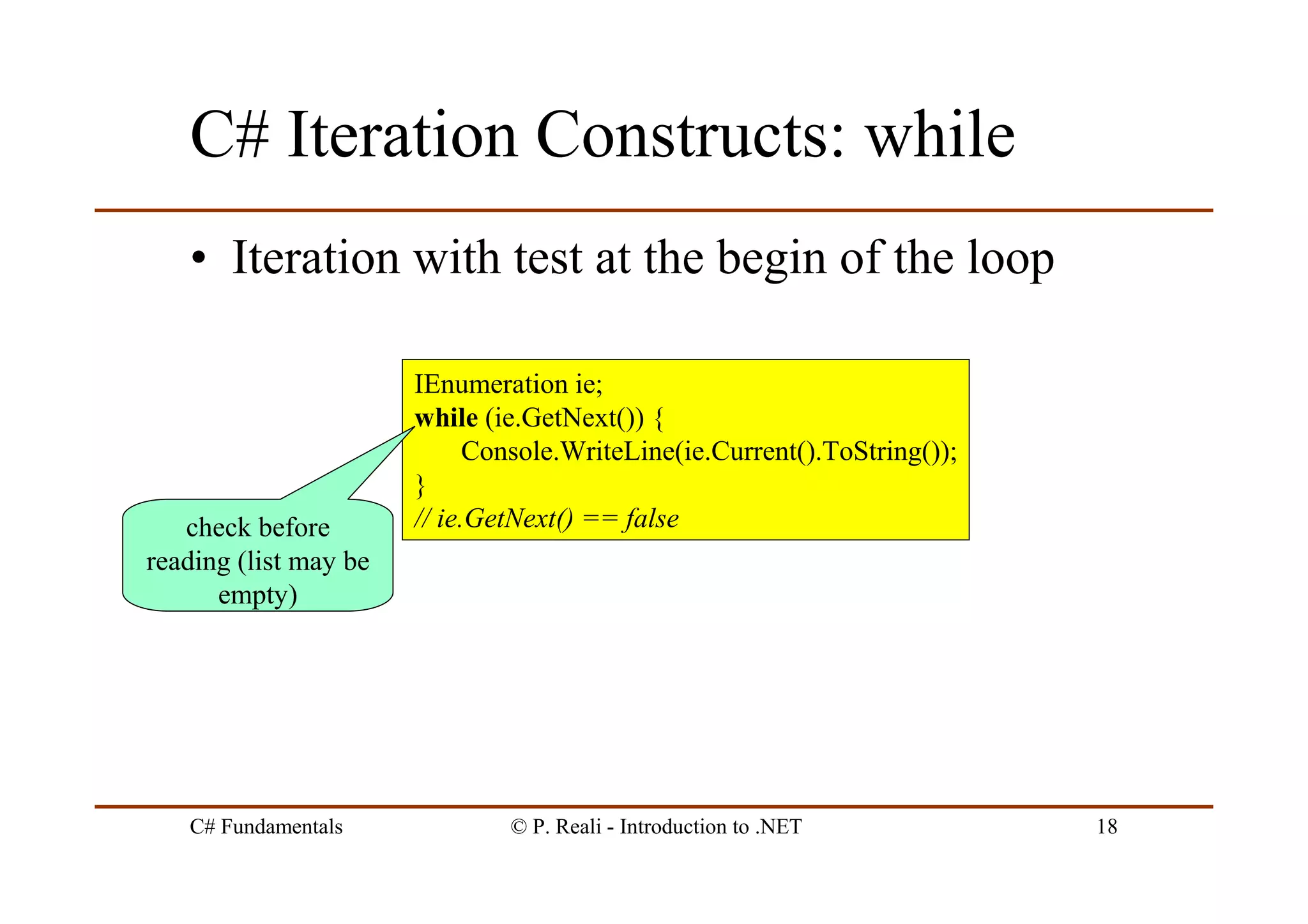
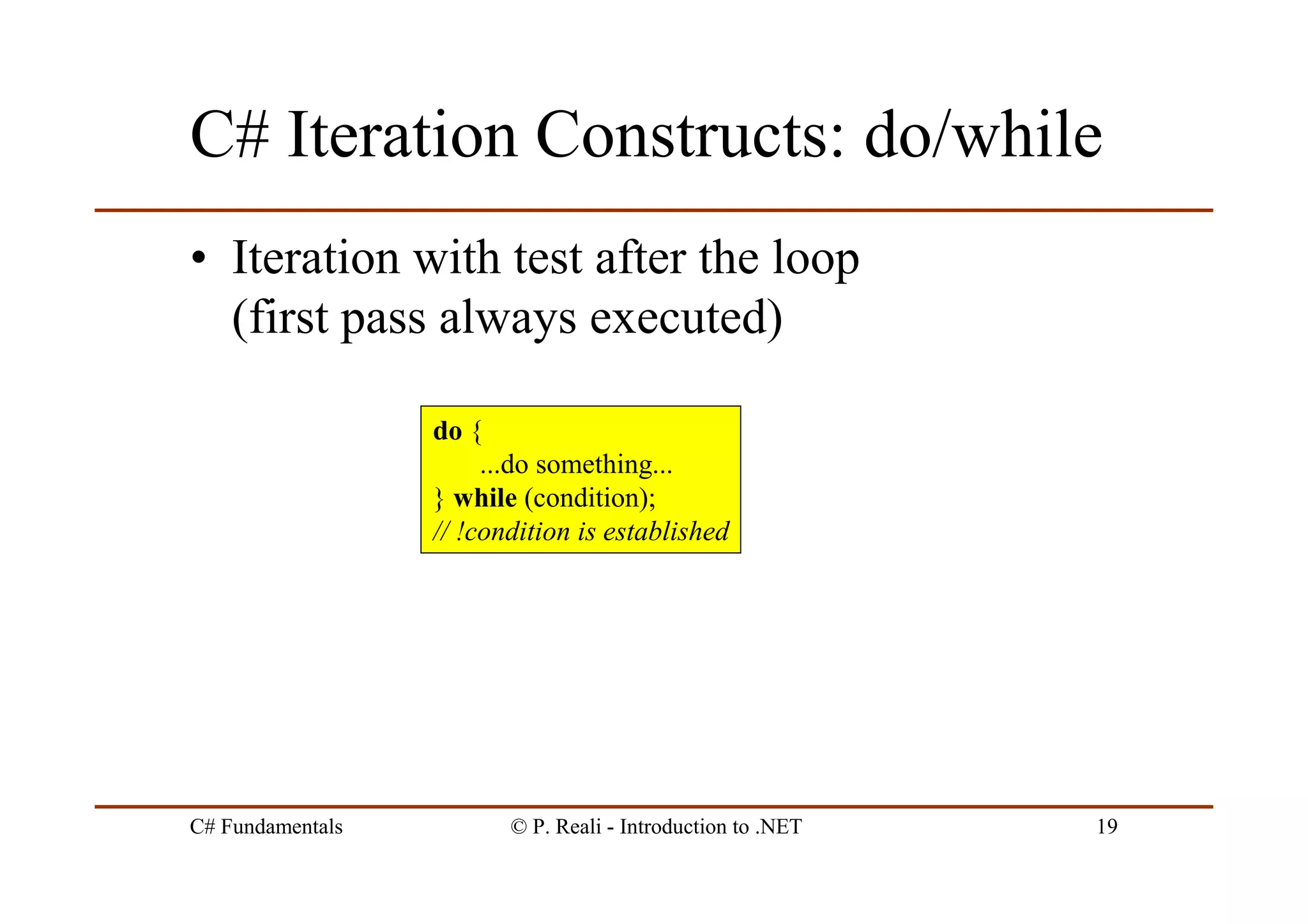
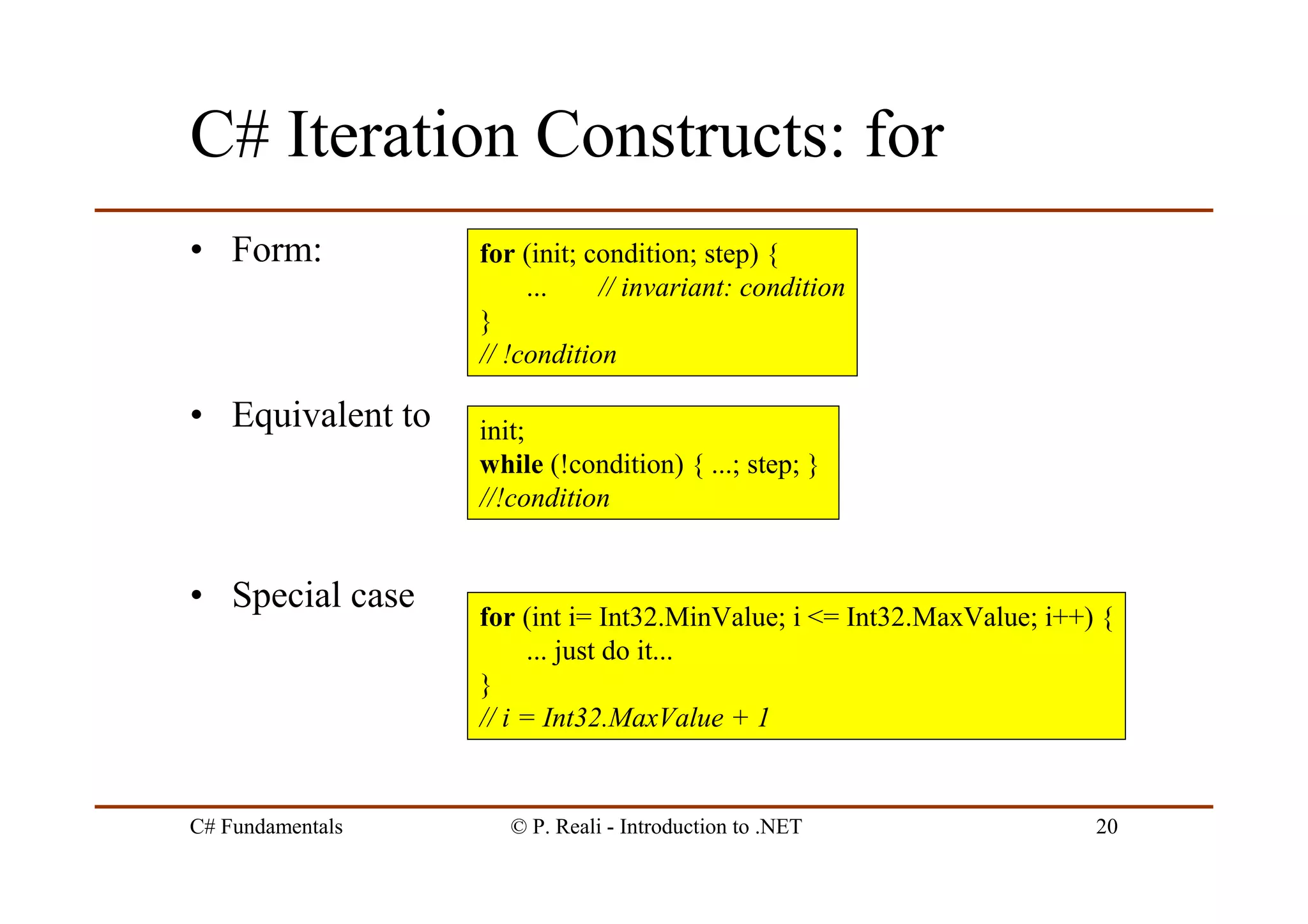
![C# Fundamentals © P. Reali - Introduction to .NET 21
C# Iteration Constructs: foreach
• Simplify access to Lists, Arrays, ...
String[] list = new String[]{„A“, „B“, „C“};
foreach (String s in list) {
Console.WriteLine(s);
}
void PrintList(IList list) {
foreach (String s in list) {
Console.WriteLine(s);
}
}
void PrintList(IDictionary dic) {
foreach (DictionaryEntry de in list) {
Console.WriteLine(„dict[{0}] = {1}“, de.Key, de.Value);
}
}
dictionaries are
enumerated as
DictionaryEntry
will throw
InvalidCastException if
some element is not a String](https://image.slidesharecdn.com/drarchanadhawanbajaj-csharpfundamentalsslides-140609140720-phpapp01/75/Dr-archana-dhawan-bajaj-csharp-fundamentals-slides-21-2048.jpg)
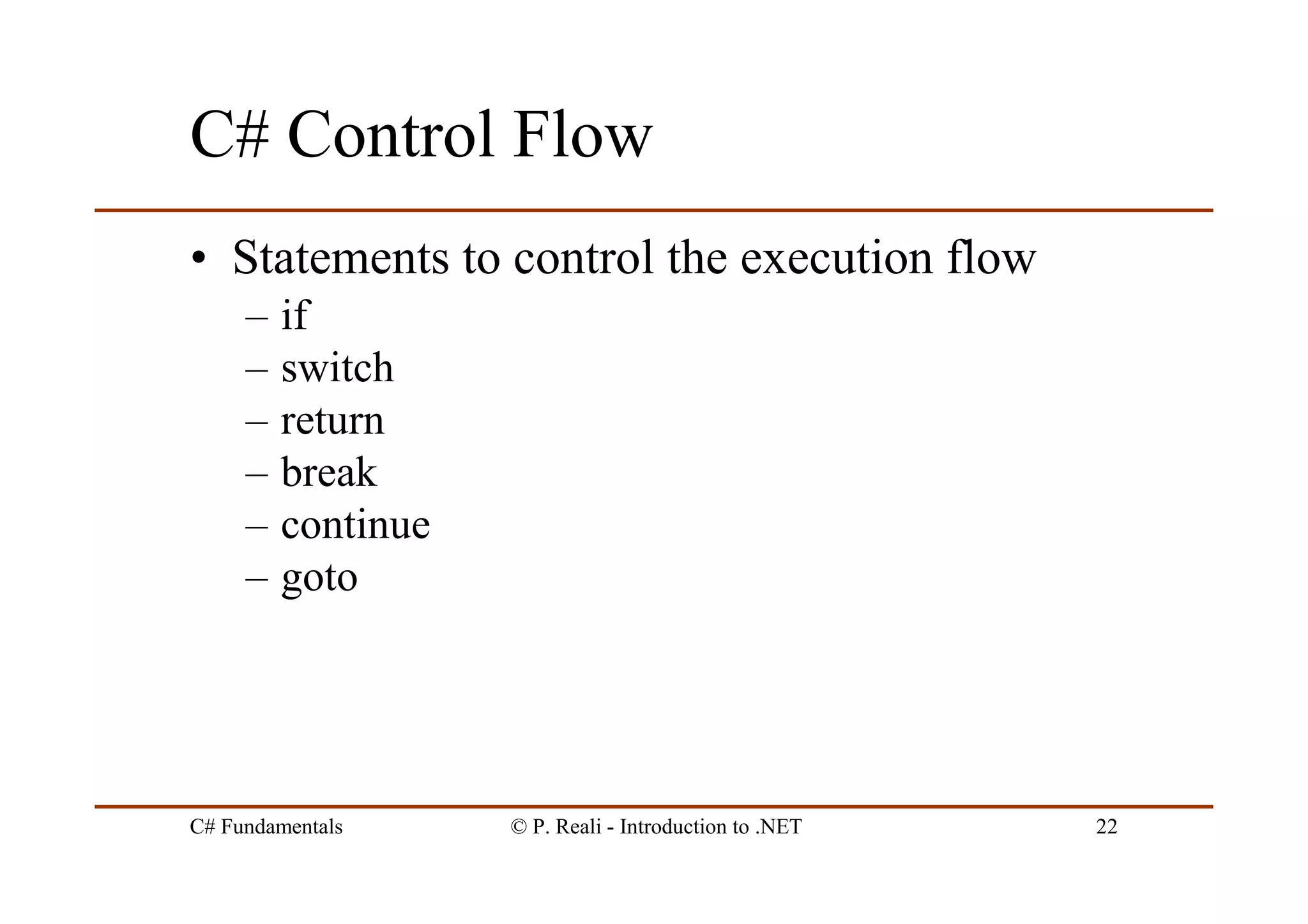
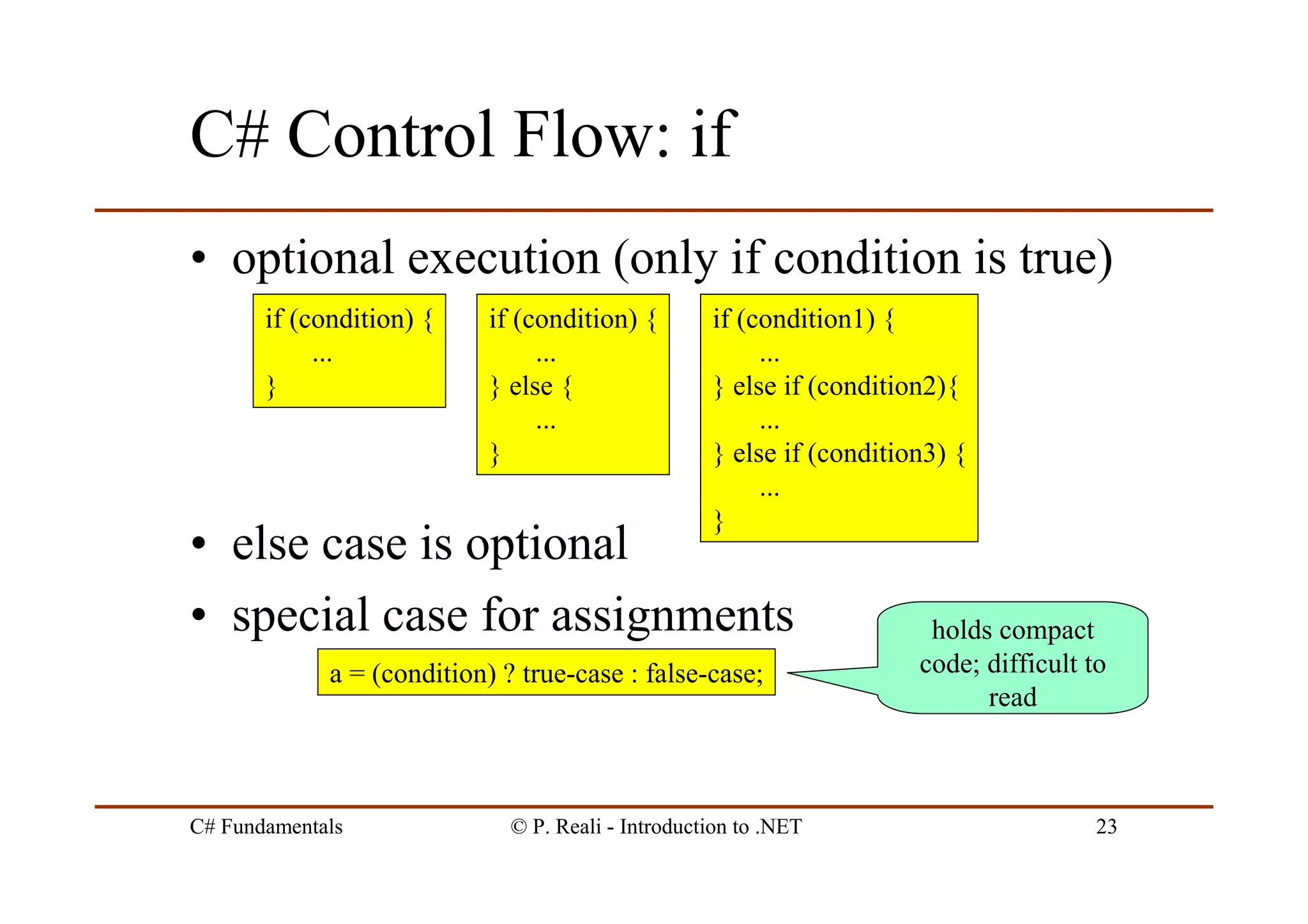
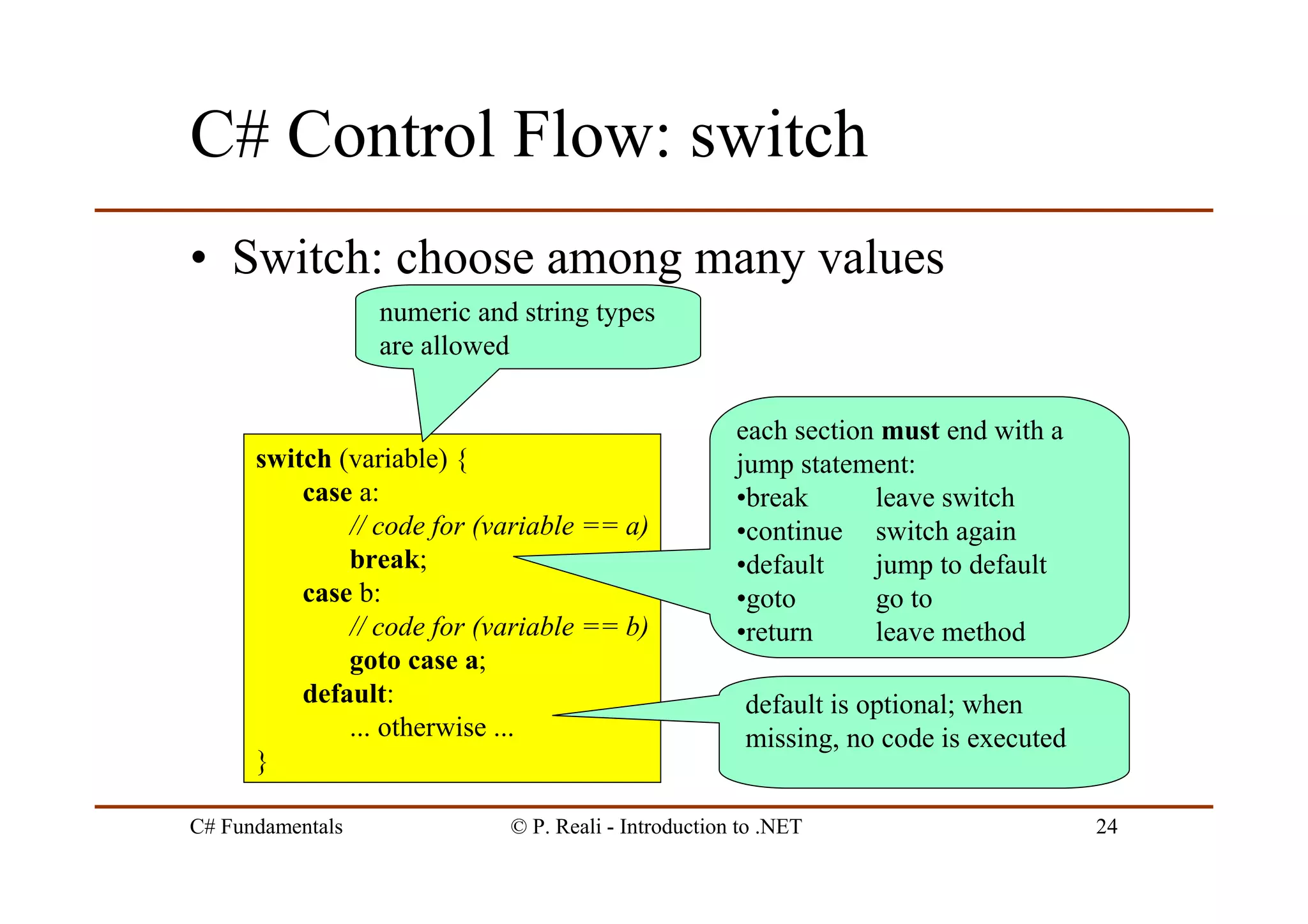
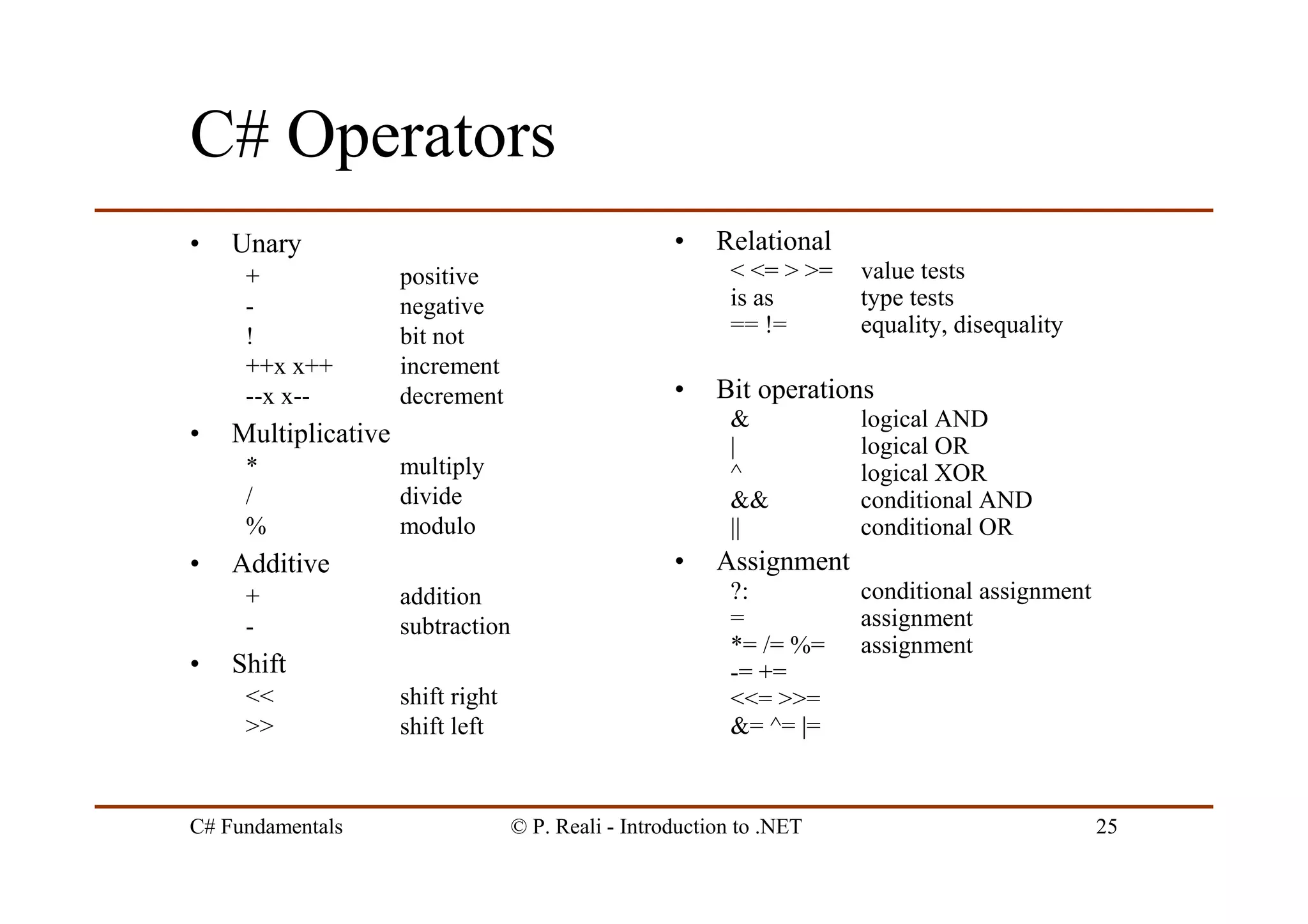
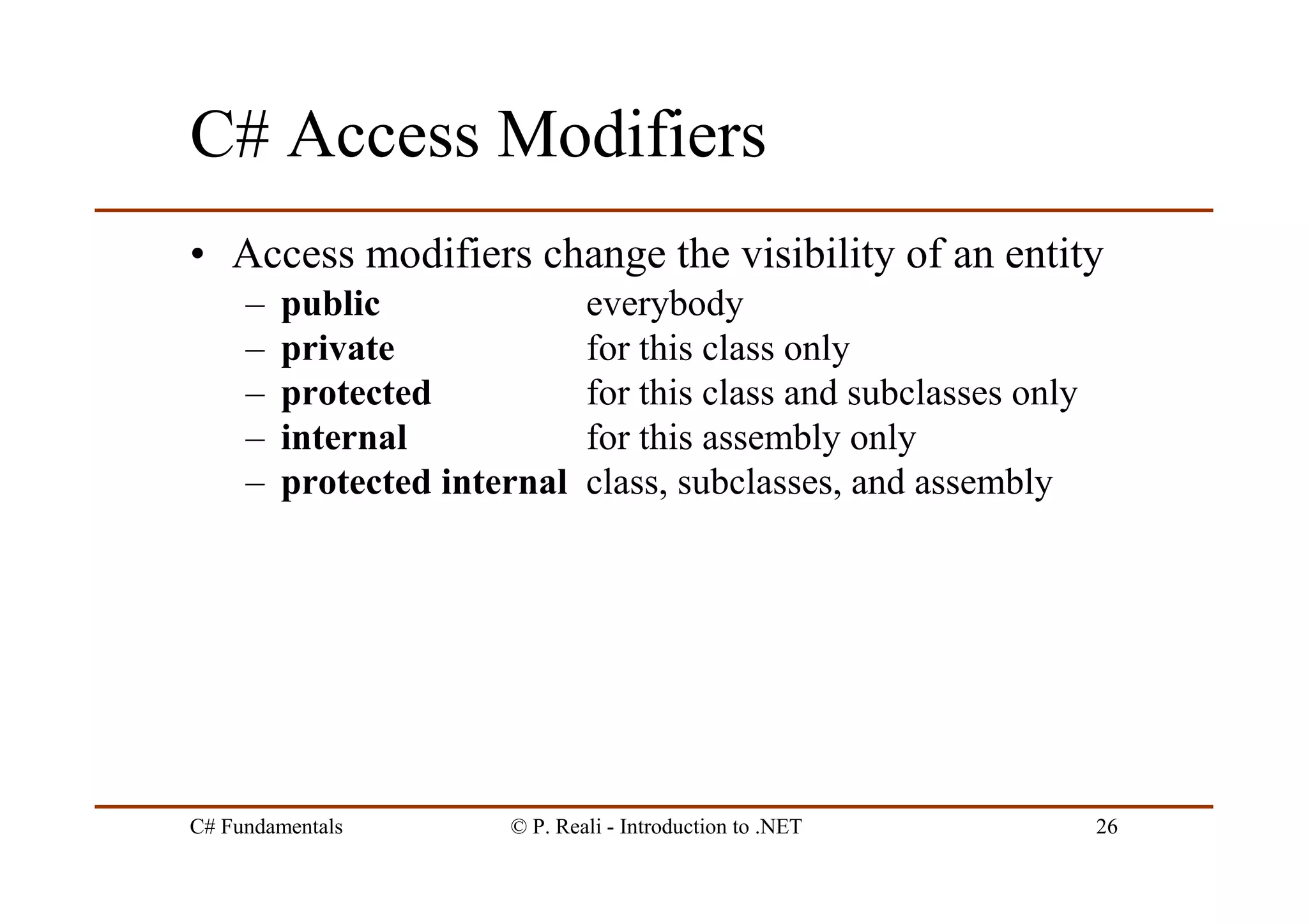
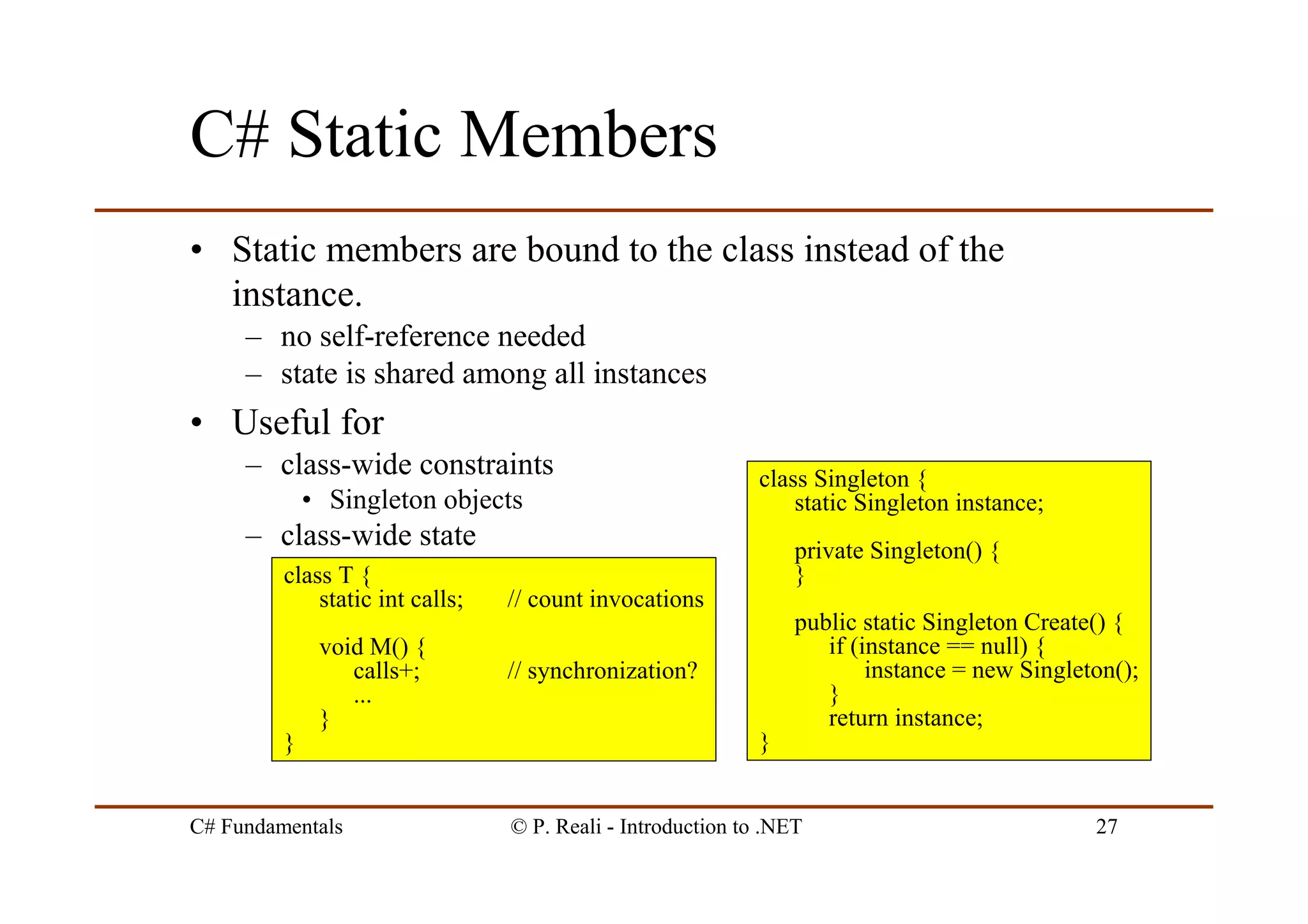
![C# Fundamentals © P. Reali - Introduction to .NET 28
C# Parameter Modifiers
• Parameter modifier change the way parameters are passed
– (none) by value (default)
– out value from method assigned to parameter
– ref by reference
– params open parameter list
• Passing an instance by value, doesn‘t protect its fields
against modification!!!
void M1(int a) ;
void M2(out int b);
void M3(ref int c);
void M4(params int[] list);
M1(a) ; // a is not changed, only value passed
M2(out a) ; // a is set
M3(ref a) ; // a is modified
M4(list) ; // open list; values of list can be modified
M4(1, 2, 3, 4) ;](https://image.slidesharecdn.com/drarchanadhawanbajaj-csharpfundamentalsslides-140609140720-phpapp01/75/Dr-archana-dhawan-bajaj-csharp-fundamentals-slides-28-2048.jpg)
![C# Fundamentals © P. Reali - Introduction to .NET 29
C# Arrays
• One-Dimensional Arrays
– int[] intList = new int[5];
– String[] sList = new String[]{„AG“, „ZH“, „BE“};
• Multi-Dimensional Arrays
– String[,] sMat = new String[9,9];
– int[,] matrix = new int[,] = new int[,]{ {1,2}, {2,1}};
• Jagged Arrays
– int[][] jag1 = new int[3][];
for(int i=0; i < jag1.Length; i++)
jag1[i] = new int[10-i];
– int[][] jag2 = new int[][] {new int[]{1}, new int[]{1,2}};](https://image.slidesharecdn.com/drarchanadhawanbajaj-csharpfundamentalsslides-140609140720-phpapp01/75/Dr-archana-dhawan-bajaj-csharp-fundamentals-slides-29-2048.jpg)
![C# Fundamentals © P. Reali - Introduction to .NET 30
System.Array
Sort one-dimensional arraySort()
Reverse itemsReverse()
Return array lengthGetLength()
Length
Return IEnumerator to traverse all elementsGetEnumerator()
Copy to another arrayCopyTo()
Set values to defaultClear()
string[] names = new String[]{„Alain“, „Pedro“, „Hannelore“, „Juliet“, „Aki“};
Array.Sort(names);
Array.Reverse(names);
Array.Clear(names, 1, 3);
Aki, Alain, Hannelore, Juliet, Pedro
Pedro, Juliet, Hannelore, Alain, Aki
Pedro, , , , Aki](https://image.slidesharecdn.com/drarchanadhawanbajaj-csharpfundamentalsslides-140609140720-phpapp01/75/Dr-archana-dhawan-bajaj-csharp-fundamentals-slides-30-2048.jpg)
![C# Fundamentals © P. Reali - Introduction to .NET 31
System.String
Split a String in a String[]Split()
[static] Join a String[] in a StringJoin()
Uppercase / Lowercase conversionToUpper()
ToLower()
Modificate a StringInsert()
Remove()
Replace()
Insert some characters in a stringPadLeft()
PadRight()
[static] Create a string using a format
(just like Console.Write)
Format()
[static] Copy a stringCopy()
[static] Concatenate stringsConcat()
String lengthLength](https://image.slidesharecdn.com/drarchanadhawanbajaj-csharpfundamentalsslides-140609140720-phpapp01/75/Dr-archana-dhawan-bajaj-csharp-fundamentals-slides-31-2048.jpg)
![C# Fundamentals © P. Reali - Introduction to .NET 32
System.Text.StringBuilder
• Strings are immutable
– "abc" + "def" + s + "xyz"
causes allocation of multiple strings
– all string operations return a new, different string
• StringBuilder: string buffer for efficient string operations
String[] names = new String[]{"Alain", "Pedro", .....};
StringBuilder sb = new StringBuilder(names[0]);
for (int i = 1; i < names.Length; i++) {
sb.Append(", ");
sb.Append(names[i]);
}
String result = sb.ToString();](https://image.slidesharecdn.com/drarchanadhawanbajaj-csharpfundamentalsslides-140609140720-phpapp01/75/Dr-archana-dhawan-bajaj-csharp-fundamentals-slides-32-2048.jpg)
